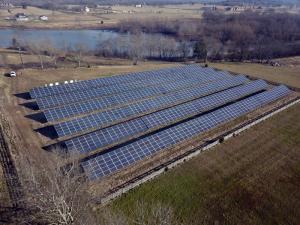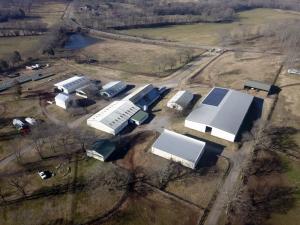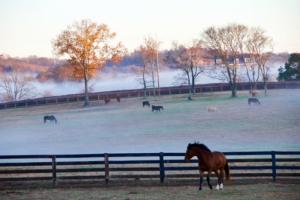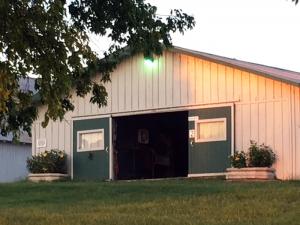By Nancy Brannon, Ph.D.
Located in the rural lands of southern middle Tennessee, Riverdale Farms, near Fayetteville, is a full service boarding, training, and events facility on over 200 acres that includes 80 acres of pasture, 100-stall barn, indoor and outdoor arenas, on-site veterinary lab, and RV sites. The equestrian disciplines practiced at Riverdale Farms are hunter/jumper, dressage and eventing; in addition, cattle are raised on part of the farm. A unique feature of Riverdale Farms is its solar generating power, generating electricity for its own use and that of the surrounding community.
Barry Brown, owner of Riverdale Farms, is also CEO of Tennessee Valley Alternative Energy (TVA Energy). The company has NABCEP (North American Board of Certified Energy Practitioners) licensed installers to complete a solar power project from engineering to construction. The company has several solar power projects across the state, such as in Rockwood, Knox County, and Moscow in west Tennessee.
The TVA Energy website explains: Solar Energy is clean, abundant, and a reasonable recourse to meet much of the world's energy needs. Harnessing the same sunlight that has kept the earth warm for eons, we can finally achieve a more sustainable balance with nature as humanity advances and find new, cleaner, and more efficient means of meeting its energy needs. Offset or eliminate utility bills in your home or building by generating reliable and clean, non-polluting solar power.
At Riverdale Farms, there are solar panels in a rooftop array on the indoor riding arena and a ground array in a section of the land. Brown explains, “We generate enough energy to run our own operation and we sell the surplus to TVA (Tennessee Valley Authority). We have a collection meter that shows how much solar power we generate, and a usage amount, which shows how much electricity we use. We sell about 450,000 KWH (kilowatt hours) annually to TVA and the farm only uses about 120,000 KWH annually. There is no battery storage, so all the electricity that is generated in a day must be used in the same day.” The solar panels were installed in 2012 when there were financial incentives for solar power.
Brown’s business has its origins in a small excavation company started by his father in 1978, which he built into a larger construction business: Brown Construction. Barry joined his father’s business in 1997 and later expanded the business further, this time into solar energy installations in 2010. By 2015 he decided to separate the solar power business from the construction business, establishing Tennessee Valley Alternative Energy. With the mandate for cleaner energy in 2016-2017, TVA offered financial incentives for installing solar panels, along with carbon credits. Unfortunately, those incentives have now expired.
The good news is that there is a federal investment tax credit for solar energy systems in place until December 31, 2023, according to the Solar Energy Industries Association (SEIA). Both residential and commercial customers can take advantage of this tax credit, and it applies to all three major types of solar technology: photovoltaic, solar heating and cooling, and concentrating solar technology. Find information about this at: https://www.seia.org/initiatives/solar-investment-tax-credit-itc
The Database of State Incentives for Renewables and Efficiency has a comprehensive list of solar incentives by state. Find information here: https://www.dsireusa.org/
The Tennessee Valley Authority (TVA) did have a dual-metering option for participants in its Green Power Providers program, but stopped accepting new applications at the end of 2019.
If you are interested in installing solar power at your home or farm, the best route is to contact a certified solar power installer to get the latest information.
Find more information about solar powered electricity generation at: www.tvaenergy.com
Of course there are plenty of equestrian activities at Riverdale Farms. Farm Manager and Trainer Beate Kuska is a Grand Prix jumper rider and she trains for hunter/jumper and dressage disciplines. The farm hosts three to four schooling shows a year as well as combined tests. The last show of their 2020 season was a Middle Tennessee Eventing Association show on December 5. (see our January 2021 issue for coverage of the show)
Find more information about Riverdale Farms at: www.riverdalefarms.net
Located in the rural lands of southern middle Tennessee, Riverdale Farms, near Fayetteville, is a full service boarding, training, and events facility on over 200 acres that includes 80 acres of pasture, 100-stall barn, indoor and outdoor arenas, on-site veterinary lab, and RV sites. The equestrian disciplines practiced at Riverdale Farms are hunter/jumper, dressage and eventing; in addition, cattle are raised on part of the farm. A unique feature of Riverdale Farms is its solar generating power, generating electricity for its own use and that of the surrounding community.
Barry Brown, owner of Riverdale Farms, is also CEO of Tennessee Valley Alternative Energy (TVA Energy). The company has NABCEP (North American Board of Certified Energy Practitioners) licensed installers to complete a solar power project from engineering to construction. The company has several solar power projects across the state, such as in Rockwood, Knox County, and Moscow in west Tennessee.
The TVA Energy website explains: Solar Energy is clean, abundant, and a reasonable recourse to meet much of the world's energy needs. Harnessing the same sunlight that has kept the earth warm for eons, we can finally achieve a more sustainable balance with nature as humanity advances and find new, cleaner, and more efficient means of meeting its energy needs. Offset or eliminate utility bills in your home or building by generating reliable and clean, non-polluting solar power.
At Riverdale Farms, there are solar panels in a rooftop array on the indoor riding arena and a ground array in a section of the land. Brown explains, “We generate enough energy to run our own operation and we sell the surplus to TVA (Tennessee Valley Authority). We have a collection meter that shows how much solar power we generate, and a usage amount, which shows how much electricity we use. We sell about 450,000 KWH (kilowatt hours) annually to TVA and the farm only uses about 120,000 KWH annually. There is no battery storage, so all the electricity that is generated in a day must be used in the same day.” The solar panels were installed in 2012 when there were financial incentives for solar power.
Brown’s business has its origins in a small excavation company started by his father in 1978, which he built into a larger construction business: Brown Construction. Barry joined his father’s business in 1997 and later expanded the business further, this time into solar energy installations in 2010. By 2015 he decided to separate the solar power business from the construction business, establishing Tennessee Valley Alternative Energy. With the mandate for cleaner energy in 2016-2017, TVA offered financial incentives for installing solar panels, along with carbon credits. Unfortunately, those incentives have now expired.
The good news is that there is a federal investment tax credit for solar energy systems in place until December 31, 2023, according to the Solar Energy Industries Association (SEIA). Both residential and commercial customers can take advantage of this tax credit, and it applies to all three major types of solar technology: photovoltaic, solar heating and cooling, and concentrating solar technology. Find information about this at: https://www.seia.org/initiatives/solar-investment-tax-credit-itc
The Database of State Incentives for Renewables and Efficiency has a comprehensive list of solar incentives by state. Find information here: https://www.dsireusa.org/
The Tennessee Valley Authority (TVA) did have a dual-metering option for participants in its Green Power Providers program, but stopped accepting new applications at the end of 2019.
If you are interested in installing solar power at your home or farm, the best route is to contact a certified solar power installer to get the latest information.
Find more information about solar powered electricity generation at: www.tvaenergy.com
Of course there are plenty of equestrian activities at Riverdale Farms. Farm Manager and Trainer Beate Kuska is a Grand Prix jumper rider and she trains for hunter/jumper and dressage disciplines. The farm hosts three to four schooling shows a year as well as combined tests. The last show of their 2020 season was a Middle Tennessee Eventing Association show on December 5. (see our January 2021 issue for coverage of the show)
Find more information about Riverdale Farms at: www.riverdalefarms.net











